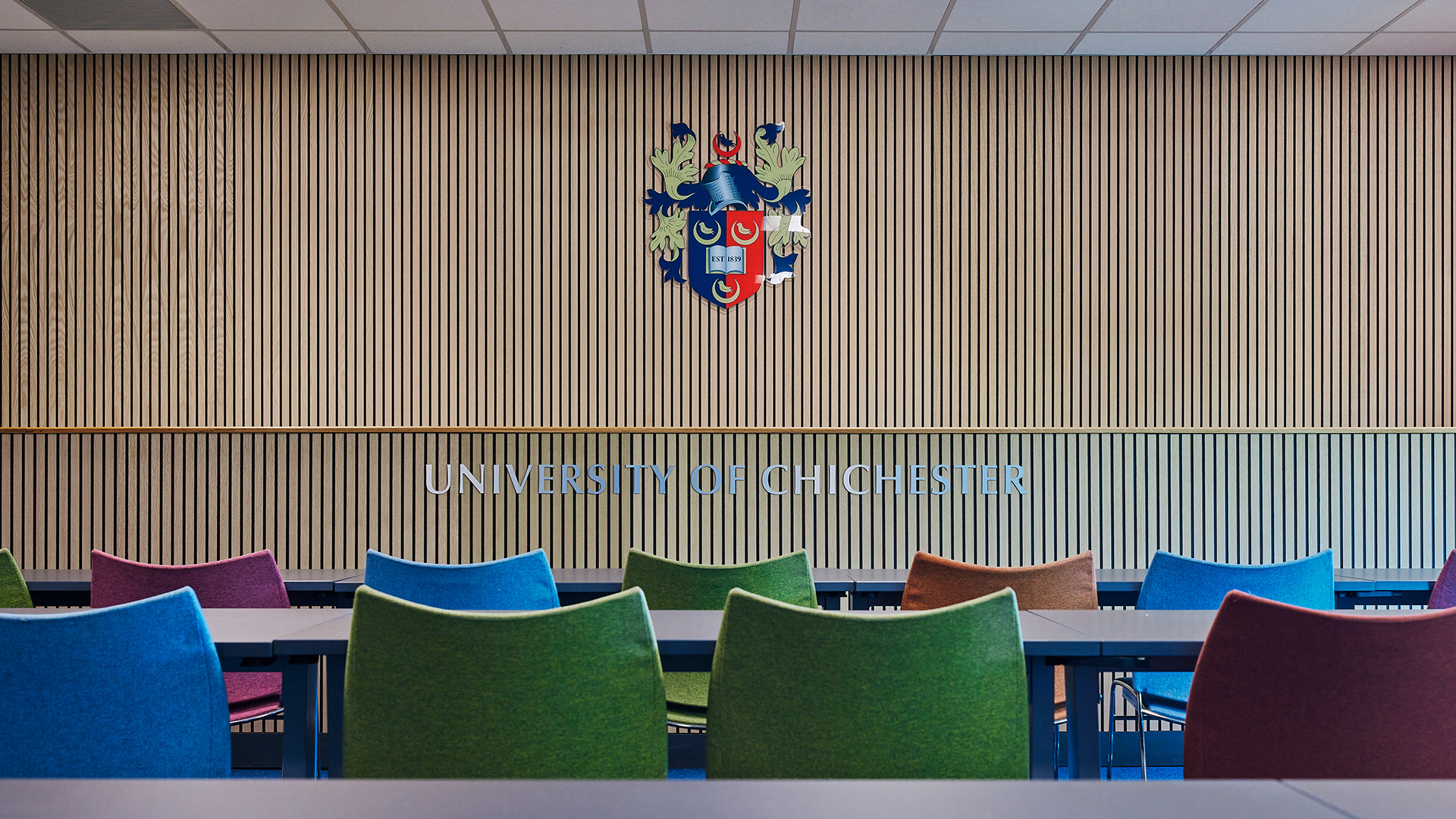1st
in the UK for overall average positivity for Law
National Student Survey 2023 and 2024
1st
in the UK for 'teaching on my course' for Law
National Student Survey 2023 and 2024
1st
in the UK for student satisfaction in Law
Complete University Guide 2026
Overview
Extend your knowledge of the legal and criminal justice systems
Develop your understanding of the law and boost your employability with our Master of Laws (LLM) degree. This year-long course will solidify your knowledge in criminal law and the criminal justice system, looking at contemporary issues and practice.
Skills for your career in law
You will hone your research, academic writing and critical thinking skills with modules including Theory of Criminal Justice, Criminal Law and Domestic and Global Terrorism. You will complete a dissertation on an area of your choice, supported by our expert academics.
Extra-curricular opportunities include pro bono work, mediation, work experience in a law firm or mini pupillage, in addition to mooting competitions, client-interviewing competitions and contributing to the University of Chichester Student Law Review.
This postgraduate degree will prepare you for a career within the criminal justice system or within law more widely.
Support for SQE 1
At the end of your Master’s degree, you will have the option to complete a specialist preparation course for the first Solicitors’ Qualifying Examination.
Start your journey
Our Law courses are suitable for those who have previously studied the subject, but previous study is not required.
The Course
Study criminal law as you learn the foundations of legal knowledge
Our LLM Criminal Law and Criminal Justice degree develops your knowledge and understanding of real world legal skills in preparation for your progression into the profession.
You will study many aspects of the law, including the following modules:
- English Legal System and Research Methods
- Theory of Criminal Justice
- International Criminal Law
- Independent Research Project
- Criminal Law (Non LLB)
- Criminal Evidence
- Domestic and Global Terrorism
- Sentencing Law and Practice
- Criminal Litigation
- Contemporary Issues in Criminal Law
SQE Preparation Pathway
If you opt to take the SQE Preparation pathway, will then return in September of year 2 for an additional semester, which will support you in preparing for the first Solicitors’ Qualifying Examination.
Select a year
English Legal System and Research Methods
This module introduces you to the different aspects of the English legal system and legal research methods. You will examine the different ways laws are made and interpreted in court, as well as how the system of precedent operates. You will form an understanding of the different personnel and courts within the English legal system and how effectively these operate. You will also develop legal research skills and identify different legal research methodology.
Theory of Criminal Justice
This module examines the different theories of criminal justice. You will study the philosophical, theoretical and historical contexts of criminal justice, alongside the agencies of the contemporary criminal justice system in England and Wales.
International Criminal Law
The field of ‘international criminal law’ is relatively recent in the domain of international legal studies and presents challenges in its precise definition. While certain crimes such as genocide, crimes against humanity, war crimes, and aggression are immediately recognisable as ‘international’ offences, numerous other transgressions, such as torture and various crimes associated with terrorism, are mandated by international treaties to be incorporated into domestic legal frameworks.
This module covers substantive international criminal law and the corresponding procedural aspects. You will examine the international courts as institutional entities, and address the conceptual and normative complexities that arise within the realm of international criminal law during its evolution, current practice, and future prospects.
Independent Research Project
This module enables students to work on an independent research project to pursue specialist interests.
Criminal Law
OptionalThis module introduces you to the different aspects of Criminal Law. You will examine the theory underpinning criminal law and the elements of criminal liability. You will develop an understanding of a range of criminal offences and be able to analyse and evaluate related case law.
You will continue to develop legal reasoning, research and referencing skills.
Criminal Evidence
OptionalThis module will introduce the legal, procedural, and evidential rules relating to criminal evidence from arrest to court. You will study a fictional case study to examine the different types of evidence, the admissibility of evidence, the use of evidence in court, and its probative value.
You will continue to develop legal reasoning, research and referencing skills.
Domestic and Global Terrorism
OptionalThis module introduces comprehensive understanding of the fundamental legal principles and strategies essential for counter-terrorism efforts. This includes an exploration of the intricate legal frameworks and techniques employed in addressing the complexities of domestic and global terrorism.
The module encourages you to analyse the challenges that democratic states encounter when attempting to effectively respond to acts of terrorism. This involves a deep examination of the ethical, legal, and practical dilemmas that arise in the context of counterterrorism within democratic societies.
Lastly, the module aims to foster engagement in contemporary legal and political discussions pertaining to national security and the most suitable approaches for combatting terrorism. By staying current with these debates, you will be better prepared to contribute to the ongoing discourse on counter-terrorism strategies and their implications for democratic societies.
Sentencing Law and Practice
OptionalThis module will give an insight into the law surrounding sentencing. A range of case studies will be examined to see how sentencing work in practice.
Criminal Litigation
OptionalThe Criminal Litigation module aims to give you a comprehensive understanding of criminal litigation within the framework of legal practice. The curriculum acquaints you with the procedural intricacies of criminal litigation in both the Magistrate, Crown and Appellate Courts, including preliminary matters and case management.
Contemporary Issues in Criminal Law
OptionalThis module provides an in-depth study of several contemporary key issues within criminal law.
You will examine contemporary legal issues within criminal law and the related legislation, precedent and reform proposals. You will also consider whether the law satisfactorily deals with these issues and how the law could be reformed for further improvement.
SQE 1 Preparation
OptionalThis module is for students who have chosen the SQE preparation pathway. It aims to support you in preparing for the externally sat and assessed Solicitors Qualifying Examination 1.
This module consists of 36 hours. In these sessions you will revise the Functioning Legal Knowledge areas 1 and 2 (covered during a qualifying LLB or (LLM) Conversion degree):
- Dispute Resolution; Contract; Tort; Legal System of England and Wales; Constitutional and Administrative Law and EU Law (FLK 1).
- Property Practice; Wills and the Administration of Estates; Land Law; Trusts; and Criminal Law and Practice (FLK 2).
You will also study aspects of business law and practice, taxation, legal services, and solicitors’ accounts to fulfil the Functioning Legal Knowledge requirements of the Solicitors’ Qualifying Examination 1.
Experience
Develop strong professional links and seize vital networking opportunities
National Student Survey 2023
Overall average positivity
Assessment and feedback
'Teaching on my course'
 |
Gain practical advocacy experience in our new mooting roomOur new purpose-built mooting room gives you the space to develop the skills needed to argue logically, confidently, and persuasively. It is the ideal location for students to practice advocacy and is the setting for our internal and inter-university mooting competitions, where teams of students argue a client’s case before a judge. |
Visiting speakers
We regularly welcome guest speakers. We recently welcomed The Right Honourable The Baroness Hale of Richmond DBE.
Close community
Our commitment to a friendly and close-knit student community contributes to a high degree of success for our graduates.
Strong professional links
In your second year, you will have the opportunity to gain vital workplace experience within a law setting.
Expert staff
You will learn from experienced and expert tutors who are here to support your development.
Learning Resource Centre
The Learning Resource Centre (LRC) contains the library, a café, IT/teaching rooms, and the Support and Information Zone (SIZ).
Library
Our campus library holds more than 200,000 books and over 500,000 eBooks.
Subject specific librarians
If you have difficulty finding material for an essay, seminar or project, subject librarians will be happy to provide assistance.
Royal Literary Fellows
Gain writing support from professional writers through the Royal Literary Fund.

Elisa

Morgan
Teaching
Feel the support of experienced expert staff with our smaller class sizes
Smaller class sizes
You will learn in small groups to allow our experienced and expert staff to mould their teaching around you.
You will develop your research, critical thinking, academic writing and employability skills.
Preparation for SQE
Dedicated support for new postgraduate examinations for solicitors
The way to qualify as a solicitor in England and Wales has changed through the introduction of a new postgraduate examination process known as the Solicitors Qualifying Examinations, known as SQE 1 and SQE 2.
You will be supported in preparing for the first of the Solicitor’s Qualifying Examinations, which you can sit after completing your degree.
This will include:
- How to make a bail application.
- The role of a duty solicitor in a police station.
- How to bring a claim in the civil courts.
- The methods of resolving a dispute without resorting to court.
Careers
Open up your future career options
Our LLM Criminal Law and Criminal Justice course allows you to work towards becoming a solicitor or barrister.
All Solicitors must pass the Solicitor Qualifying Exam (SQE Parts 1 & 2), with the University of Chichester offering specific support for our students to take the first part after they graduate.
Other career paths include:
- Prison or Probation Service
- Court and Tribunals Service
- Crown Prosecution Service
- Police
- Civil services
- Teaching
Some Law students choose to pursue a career within teaching. At Chichester, we offer postgraduate options to allow you to qualify as teacher.
Postgraduate pathways
- PGCE Primary (5-11)
- PGCE Primary (5-11): Modern Languages
- PGCE Secondary (with subject specification)
University of Chichester alumni who have completed a full undergraduate degree at the University will receive a 15% discount on their postgraduate fees.
Course Costs
Course Fees 2025/26
UK fee
UK fee
International fee
International fee
There are multiple routes for the LLM for UK students:
- Option 1 is LLM only at £10,260
- Option 2 is LLM with SQE preparation at £12,780
There are multiple routes for the LLM for international students:
- Option 1 is LLM only at £15,840
- Option 2 is LLM with SQE preparation at £15,840
If you want to sit the SQE exam, then this can be booked and paid for at a Pearson’s assessment centre externally. There is a cost for UK students – find out more on the Solicitors Regulation Authority website.
University of Chichester alumni who have completed a full undergraduate degree at the University will receive a 15% discount on their postgraduate fees.
Entry Requirements
Typical Offer (individual offers may vary)
Honours degree
IELTS
Students wishing to take the SQE must have an LLB in Law or Law conversion.
If an applicant has a non-UK degree and intends to qualify as a barrister, they should also have a certificate of academic standing from the Bar Standards Board.



